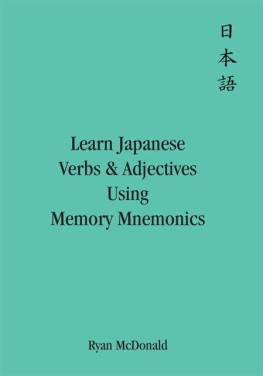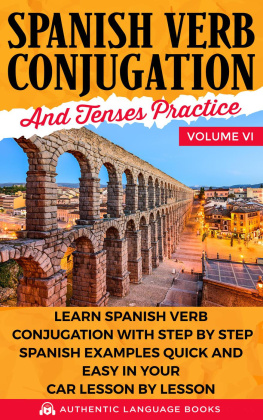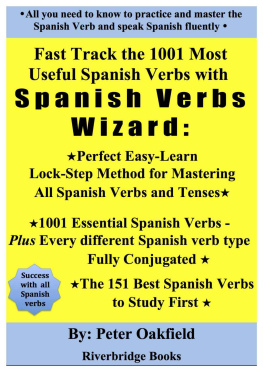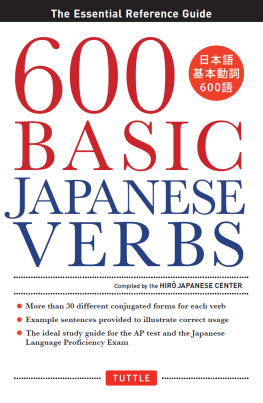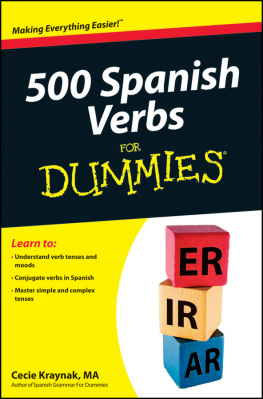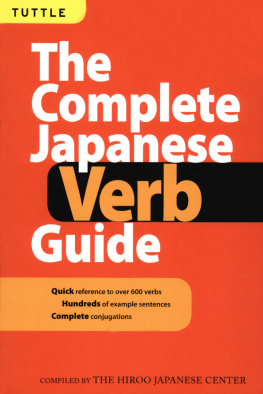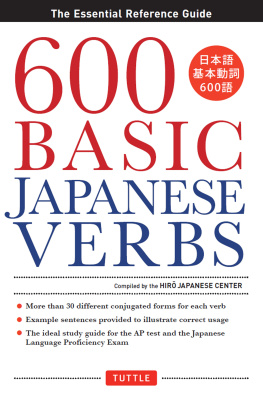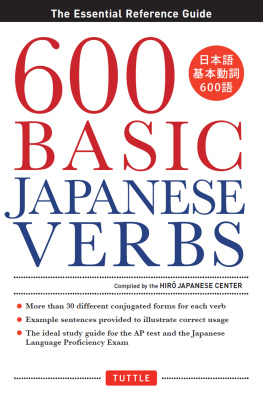Learn Japanese
Verbs & Adjectives
Using
Memory Mnemonics
Ryan McDonald
Copyright 2003 Ryan McDonald. All rights reserved.
No part of this publication may be reproduced, stored in a retrieval system, or transmitted, in any form or by any means, electronic, mechanical, photocopying, recording, or otherwise, without the written prior permission of the author.
National Library of Canada Cataloguing in Publication Data
McDonald, Ryan
Learn Japanese verbs and adjectives using memory
mnemonics / Ryan McDonald.
ISBN 978-1-4120-0419-0 Softcover
ISBN 978-1-4122-1266-3 eBook
I. Title.
PL570.M36 2003 495.682421 C2003-903269-8
TRAFFORD
This book was published on-demand in cooperation with Trafford Publishing.
On-demand publishing is a unique process and service of making a book available for retail sale to the public taking advantage of on-demand manufacturing and Internet marketing. On-demand publishing includes promotions, retail sales, manufacturing, order fulfilment, accounting and collecting royalties on behalf of the author.
Suite 6E, 2333 Government St., Victoria, B.C. V8T 4P4, CANADA
Phone 250-383-6864 Toll-free 1-888-232-4444 (Canada & US)
Fax 250-383-6804 E-mail
Web site www.trafford.com TRAFFORD PUBLISHING IS A DIVISION OF TRAFFORD HOLDINGS LTD.
Trafford Catalogue #03-0788 www.trafford.com/robots/03-0788.html
10 9 8 7 6 5 4 3 2
Contents
Learn Japanese Verbs & Adjectives
Using Memory Mnemonics
There are a few purposes in this book. The main one is to help you learn Japanese faster. I believe memory mnemonics will do just that. Verbs are a crucial stage in learning any foreign language, and once you get a firm grasp of them your skills noticably improve. The second reason is to show you how to use mnemonics to learn anything faster. I dont expect you to use only my suggestions, but I hope they will be a launch pad for your own. The third reason is I already had the mnemonics documented when I realized there were no other books like this on the market. I used them to learn Japanese verbs, adjectives, and vocabulary and feel others can benefit from the idea as well.
Once I really decided on using mnemonics for learning verbs I was able to learn several hundred in just days. Using mnemonics and a few other techniques I was able to learn faster, and more importantly retain them permanently. I have learned several verbs I never use, but when I flip through my flash cards months after learning and never using them, I still instantly remember most all the verbs. There are a few that I could think of no decent, or even remote mnemonics for. You might be able to see one right away. If so, please contact me and Ill make a change in the next revision of the book, and give you credit.
I am no brain specialist in any way so any opinion I give in this book is merely based on my experience and is only my opinion. However, whether or not they are true, some of my answers do make sense and will help explain the use of mnemonics.
The first thing to keep in mind about mnemonics is they can and should be silly or stupid. Unfortunately some of the best ones are not appropriate to be printed in this book, as they deal with foul language, sex, or obscure references to things only I would understand. The reason for this is the best mnemonic should be the first thing you think of when you say the word. Most of the mnemonics, or triggers, in this book are the first things that came to mind, though some had to be edited for publication.
The second thing to know is you need to be creative and be able to think abstractly. Lets take the Japanese verb midasu for example. It means to disturb or corrupt. For some triggers I use a play on words based on the Japanese pronunciation, for others I use an English word buried in the word. Initially for midasu I tried to sound it out and alter the Japanese sound. It is pronounced me dah sue so I played with me dad sued,my dad sued, and me does two but nothing really fit. Then I looked at the word in English and saw midas, as in King Midas, and instantly thought, King Midas was corrupt with greed therefore Midasu means to corrupt, or to disturb.
Another thing to know about triggers and mnemonics is, at least in this book, sometimes I mispronounce the Japanese on purpose to make it sound different. Quite often I use poor grammar to get two sounds closer to each other such as how she do (in the race) to sound like hashiru which means to run. I might say me saw you instead of I saw you. Here is a different example, the verb okoru means to get angry. This one took me a while, then I thought of how it almost sounds in English, Ill call you and I remembered how angry girls get when guys say Ill call you but never do. So in this example I said Okoru fast a few times and heard it almost sound different. I made the o into Ill and the ko into call and the ru into you. Its a stretch, but I have never forgotten it and I doubt you will.
Why do triggers work?
The way I understand my brain is that I have an instantphotographic memory. However, I can never remember anything (I never load the film, I know I know). In certain situations I do remember things after seeing them once, but other times I have to practice over and over. What I think happens is my brain instantly makes a written record of whatever its trying to learn. However, after that it sometimes forgets where it put the record, or how it filed it. Maybe it filed meeting a new person under things I did Thursday or guys who look like Santa Claus instead of New people I met. It needs a trigger to remind it where it stored it.
So in essence we all have photographic memories, we just have trouble with recollection. Triggers help remind our brain where it stored some piece of information. Triggers help our brains recollect where it stored some data earlier. It is already there, but where is it stored. Once in college I made a % 100 on a Geology test about the different geological periods of history. The teacher thought I cheated since I never payed attention in class, so I wrote them all out, in order, right in front of him.
Obviously I used triggers for that, although I used a different type. I used a minimizing type of trigger for that. Thats where you take the first letters of a list, even an ordered list, and make a sentence. So take for example the Mesozoic period which consisted of, in order, the Triassic, Jurassic, and Cretaceous periods. For this I would remember, M e T ri J u C r and come up with a visual image of me trying to jump a crater. I did this for the entire geological period, each with its own little silly visual image. The visual image is the real key, your brain loves visual images, they are easy to recall, especially if they are vivid and exaggerated and far-fetched.
How to fully utilize memory triggers
Even when using triggers the need for repetition still exist, however, triggers allow us to learn without as much constant repeating. When I learn a new word I repeat the word, the trigger, and then the meaning a few times. When I repeat them I really focus and put all my energy into visualizing the trigger. For the example with midasu, I see King Midas dancing around turning things to gold. The image is vivid and clear so my brain has an easy time remembering it.
Before all this I write the words out on note cards. I only had a few cards so I would write the Japanese verb in the upper left corner and then the meaning on the opposite side. Then I did the same on the other side of the card in the diagonal corner. This way I could fit two words and their meanings on each card.
I found it better to study in little spurts rather than one long intense session. Theres a thing called Active Rehearsal where your brain will continually practice things its learning even after you stop studying. I would take the cards with me everywhere and spend about 15-30 minutes flipping through the cards while repeating the word, the trigger, and the meaning. The whole time Im thinking of each visual mental trigger. Then I wouldnt think about them at all for a few hours. The next time I had a little free time, I would repeat the process.
Next page
